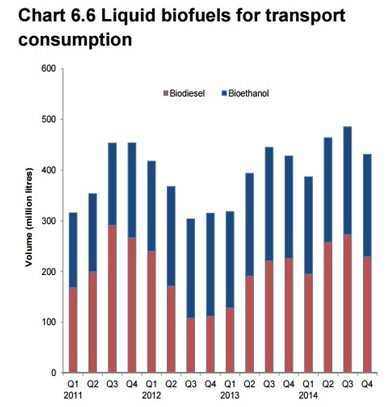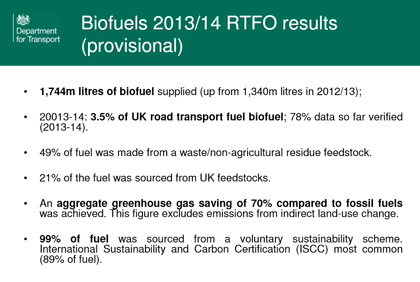Biofuels in the United Kingdom
Contents
Overview of biofuels in the United Kingdom - from feedstock to end use view info >>
Biofuels ministries, organisations and agencies in the United Kingdom view info >>
Key biofuels industry and research stakeholders in the United Kingdom view info >>
Advanced biofuels demonstrations and R&D Projects in the United Kingdom view info >>
Biofuels policy, regulations, market development and support in the United Kingdom view info >>
Reports related to biofuels in the United Kingdom view info >>
Biofuels events in the United Kingdom view info >>
Overview of biofuels in the United Kingdom - from feedstock to end use
The U.K. Department of Energy and Climate Change DECC announced a record 1.767 billion litres of liquid biofuels were consumed by the country’s transport sector during 2014. [Source: DECC].

Copyright © DECC 2014
UK Biofuel Statistics 2013-2014
- 1.767 billion litrs of liquid biofuels were consumed in 2014, up 11.5 % from 1.586 billion litres in 2013.
- Ethanol consumption fell by 0.9 % from 820 million liters in 2013 to 812 million litres in 2014.
- Biodiesel consumption increased by 25 %, from 766 million litres in 2013 to 955 million litres in 2014.
- 1,310 million litres of renewable fuel have been supplied, which is 3.45% of total road and non-road mobile machinery fuel. 953 million litres (73%) of this renewable fuel has so far been demonstrated to meet the sustainability requirements.
- 1,412 million RTFCs have been issued to fuel meeting the sustainability requirements, of which 917 million were issued to double counting feedstocks.
- Of the 953 million litres so far meeting the sustainability requirements, bioethanol comprised 51% of supply, biodiesel (FAME) 45% and biomethanol and methyl tertiary butyl ether (MTBE) 4%. There were also small volumes of biogas and pure vegetable oil.
C&S characteristics of the biofuels to which RTFCs have been issued:
- The most widely reported source for biodiesel (by feedstock and country of origin) was used cooking oil from the UK (108 million litres, 11% of total fuel, 25% of biodiesel).
- The most widely reported source for bioethanol (by feedstock and country of origin) was corn from the Ukraine (72 million litres, 8% of total fuel, 15% of bioethanol).
- 48% of fuel was made from a waste/non-agricultural residue (double counting) feedstock.
- 23% of the fuel was sourced from UK feedstocks.
- An aggregate greenhouse gas saving of 70% compared to fossil fuels was achieved. This figure excludes emissions from indirect land-use change.
- 99% of the fuel was sourced from a voluntary scheme.
- The most commonly used voluntary scheme was ISCC (88% of fuel) followed by Abengoa RED Bioenergy Sustainability Assurance (9%).
Source: UK Biofuel statistics: Year 6 (2013 to 2014), report 3
Biofuels ministries, organisations and agencies in the United Kingdom
- BBSRC - Biotechnology and Biological Sciences Research Council
- Centre for Process Innovation
- Department of Energy and Climate Change DECC
- Department of Transport, Low Carbon Fuels
- Energy Technologies Institute
- Scottish European Green Energy Centre - SEGEC
- Technology Strategy Board
Key biofuels industry and research stakeholders in the United Kingdom
- Argent Energy
- Aston University, Bioenergy Research Group
- BP
- British Airways
- British Sugar
- Green Biologics
- Greenergy
- Imperial College London - ICEPT
- INEOS Bio Limited
- Integrated Biorefining Technologies Initiative (IBTI)
- Lubrizol Ltd
- National Non-Food Crops Centre
- Norton Rose LLP
- QUESTOR Centre, Queen's University of Belfast
- Renewable Energy Association - Renewable Transport Fuels Group RTFG
- Scottish Association for Marine Science
- Scottish Bioenergy
- Supergen Bioenergy
- Syngenta Seeds Ltd
- Tyndall Centre Manchester
- University of Cardiff
- University of Exeter
- University of Greenwich
- University of Swansea
- University of York - CNAP Centre for Novel Agriculural Products
- Velocys
- Vireol
- Vivergo Fuels
Advanced biofuels demonstrations and R&D Projects in the United Kingdom
- British Airways / Solena GreenSkys biojet fuel plant - shelved in January 2016, citing lack of government support
- BP / DuPont Butamax™ technology. In 2009, BP and DuPont announced the formation of Kingston Research Ltd and the establishment of a £25 million advanced biofuels research centre in Hull for demonstration of biobutanol technology
- Green Biologics has developed Butafuel™ technology, and is coordinator of the Horizon 2020 project ButaNext (2015 - 2018)
- Velocys has developed Fischer-Tropsch technology for BtL value chains, which is being demonstated in the United States (See Red Rock Biofuels)
- Aston University (Euopean Bioenergy Reseach Institute) has been involved in Pyrolysis and Gasification RTD and demonstration for many years and coordinates BRISK, a €10.84M four-year initiative with €8.98M funded under EC FP7 (Ref: 284498). BRISK aims to develop a European Research Infrastructure for Thermochemical Biomass Conversion
- 10.3 MW biomass gasification plant in Tyseley, UK (See Carbonarius)
- University of Greenwich, UK, announced it is leading a 4-year €10 million project supported by EC FP7 to develop the microalga Dunaliella as a sustainable raw material that captures carbon dioxide and can grow in some of the world’s harshest environments. The project will build a biorefinery called the 'D-Factory'.
Biofuels policy, regulations, market development and support in the United Kingdom
Renewable Energy Action Plans
- National Action Plan for Renewable Energy including Transport and Biofuels
- Renewable Energy Progress Report - including Biofuels and Bioenergy
Biofuels Promotion in UK
Advanced Biofuel Demonstration Competition
In December 2014, the UK Department for Transport launched the Advanced Biofuel Demonstration Competition to support the production of UK-based advanced biofuels. The Competition will provide up to £25 million in grant funding for major demonstration projects providing transformative and innovative solutions. Ricardo-AEA and E4tech have been appointed as delivery partners for the Competition and post-award monitoring.
The Competition will be run in two phases; phase 1 will be open for Expressions of Interest between 10th December 2014 and 13th February 2015. Application forms are available on the scheme website. Successful phase 1 applicants will be invited to submit phase 2 applications for 12th June 2015. Further details of the application and award process are summarised below.
Those interested in the Advanced Biofuels Demonstration Competition should This email address is being protected from spambots. You need JavaScript enabled to view it. to ensure they are kept up to date as the scheme progresses. An information event will be held in London on Wednesday 14th January 2015 and attendees are asked to register via the Competition webpages.
Further information is available from the following links:
Feasibility Study (led by E4tech)
Presentation on policies to promote development of waste-derived and advanced biofuels in the UK (EBTP SPM6, October 2014)
UK experience of the Renewable Transport Fuel Obligation and policies to promote the development of waste-derived and advanced biofuels
Jonathan Hood, Low Carbon Fuels, Department for Transport

Reports related to biofuels in the United Kingdom
- UK Biofuel statistics: Year 6 (2013 to 2014), report 3, DECC, 2014
- Bioenergy – Insights into the future UK Bioenergy sector, gained using the ETI’s Bioenergy Value Chain Model (BVCM), Energy Technologies Institute, 2015
- Building a high value bioeconomy: Opportunities from Waste, UK Government, 2015
- IEA Task 34 Pyrolysis: Country Report, United Kingdom, 2014
- UK Anaerobic Digestion Strategy and Action Plan 2014, DEFRA, 2015
- IEA Bioenergy Task 40 (Sustainable International Bioenergy Trade): Country report for the United Kingdom 2011, 2011
